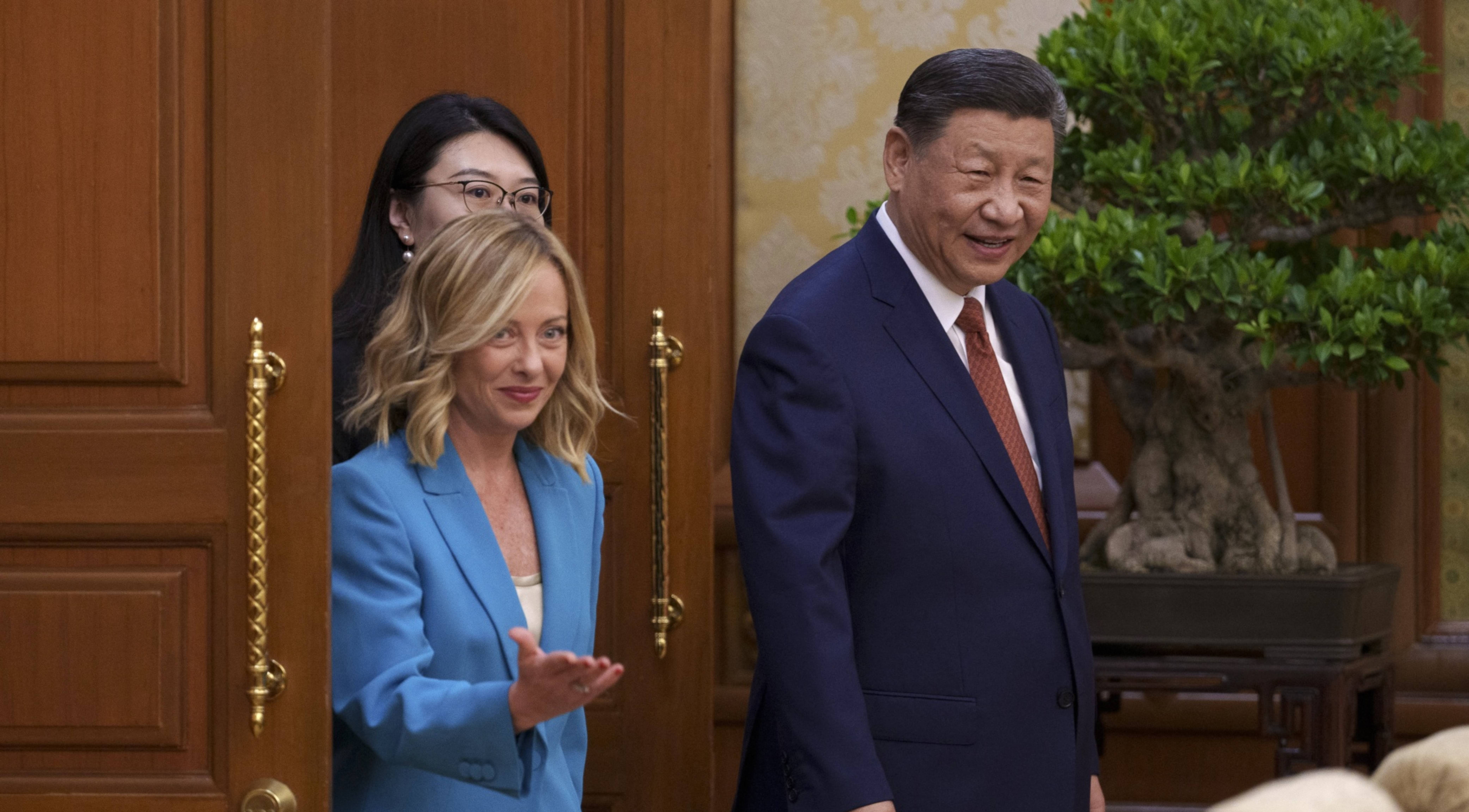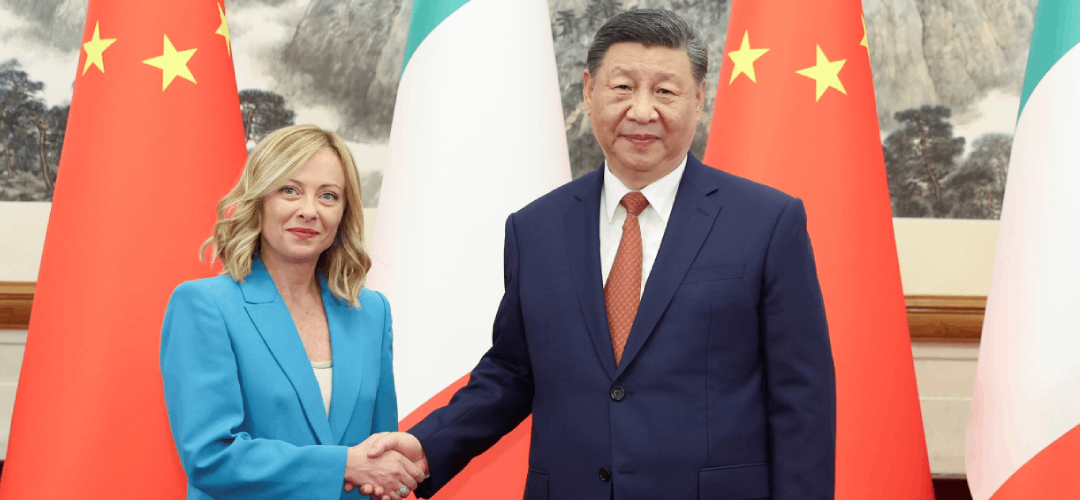Giorgia Meloni is trying to preserve a delicate balance between historical fascism and contemporary governance.
Giorgia Meloni, the Prime Minister of Italy, has recently embarked on a significant diplomatic initiative to rejuvenate Italy-China relations. This development marks a notable shift in Italy’s foreign policy under Meloni’s leadership, particularly given her administration’s ideological roots and the broader geopolitical landscape.
Background
In late July 2024, Giorgia Meloni made her first official visit to China since taking office, signalling a concerted effort to “relaunch” economic ties between the two nations. During her five-day trip, she engaged in high-level discussions with Chinese President Xi Jinping and Premier Li Qiang. The primary focus of these discussions was enhancing bilateral cooperation in various sectors, including shipbuilding, aerospace, new energy, and artificial intelligence.
This visit follows Italy’s withdrawal from China’s Belt and Road Initiative (BRI) in 2023, a move Meloni previously criticized as a “serious mistake” made by her predecessors. Meloni’s commitment to reviving relations with China is underscored by her signing a three-year action plan to foster economic collaboration. This plan seeks to advance cooperation in industrial sectors, food safety, education, and electric vehicles. Notably, the electric vehicle sector has become a focal point of trade tensions between China and the European Union. Italy supports the EU’s decision to impose substantial tariffs on Chinese imports.
As the leader of the Brothers of Italy party, which has roots in Italy’s post-fascist movement, Meloni’s administration is often scrutinized for its ideological lineage. The party’s historical connections to fascism raise questions about its stance on international relations, particularly with authoritarian regimes like China’s. Meloni’s government has adopted a more pro-Western and pro-NATO stance than previous administrations, reflecting a complex balancing act between Italy’s historical ties and contemporary geopolitical realities. U.S. pressure and concerns over China’s growing influence in Europe influenced the decision to withdraw from the BRI. However, Meloni’s current outreach to China suggests a pragmatic approach, prioritizing economic benefits while navigating the ideological implications of engaging with a regime that embodies many characteristics of the authoritarianism associated with fascism.
The ongoing conflict in Ukraine significantly shapes Meloni’s foreign policy, with substantial implications for Italy’s relations with the U.S. and China. In her discussions with President Biden before she visited China, Meloni emphasized Italy’s commitment to supporting Ukraine against Russian aggression, aligning with Western allies in their stance against Moscow. This alignment reflects a broader commitment to NATO and transatlantic cooperation, contrasting her engagement with China. Meloni’s balancing act between supporting Ukraine and engaging with China illustrates the complexities of contemporary geopolitics, where nations must navigate competing interests and historical legacies. Her administration’s approach to China may be seen as an attempt to leverage economic opportunities while maintaining a strong stance on European security and defence issues.

Analysis
Meloni’s efforts to strengthen economic ties with China are driven by the recognition of China’s significance as a trading partner. In 2023, trade between Italy and China reached approximately €66.8 billion, making China Italy’s largest trading partner outside the EU after the U.S. Meloni’s administration aims to create a more balanced trade relationship, emphasizing mutual growth and cooperation. However, this economic engagement is fraught with challenges. The European Union’s protective trade policies, particularly regarding electric vehicles, pose potential obstacles to Italy’s ambitions. The EU’s decision to impose tariffs on Chinese imports reflects growing concerns about China’s economic practices and its impact on European industries. Meloni’s support for these tariffs indicates a cautious approach to engaging with China, balancing economic interests with domestic political considerations and EU solidarity. Meloni’s outreach to China can be interpreted as a pragmatic response to economic pressures, but it also raises questions about Italy’s long-term strategic vision and its alignment with Western values.
As Meloni seeks to relaunch Italy’s relationship with China, the implications of her policies will resonate beyond bilateral ties, influencing Italy’s role in the European Union and its position in the global order. The historical context of her administration, particularly its connections to fascism, adds a layer of complexity to her foreign policy, inviting further scrutiny and analysis as Italy charts its course in an increasingly interconnected world.
Under Mario Draghi’s leadership, Italy adopted a more cautious and protective stance towards China. Draghi’s government utilized the “Golden Power” mechanism to scrutinize and block Chinese investments in critical sectors, including telecommunications and semiconductors. His administration’s decision to withdraw from the BRI was influenced by concerns over transparency and the potential risks associated with China’s economic ambitions in Italy. Draghi’s approach focused on safeguarding national interests while maintaining Italy’s commitments to its Western allies, particularly considering rising tensions between the U.S. and China. In contrast, Giuseppe Conte’s tenure saw Italy embrace a more open engagement with China, culminating in Italy becoming the first G7 nation to join the BRI in 2019. Despite criticisms from the U.S. and other European nations, Conte’s government viewed the initiative as an opportunity to boost investment and trade. This period was marked by a willingness to deepen economic ties with Beijing, which some analysts argue may have compromised Italy’s strategic autonomy in the face of Chinese influence.
Her party’s ideological roots also shape Meloni’s stance on China. As the leader of the Brothers of Italy, a party with historical ties to Italy’s post-fascist movement, Meloni’s foreign policy reflects a blend of nationalism and Atlanticism. She has positioned herself as a defender of Western values, advocating for a tougher stance against authoritarian regimes, including China and Russia. This ideological framework influences her approach to international relations, as she seeks to balance economic interests with a commitment to democratic principles.
Assessment
- Meloni’s recalibration of Italy’s relationship with China carries significant implications for the country’s foreign policy. Her administration’s focus on enhancing economic cooperation while maintaining a sceptical stance towards Beijing aligns with broader trends in Europe, where concerns about China’s economic practices and geopolitical ambitions are growing.
- For instance, the decision to support the European Commission’s tariffs on Chinese electric vehicles illustrates a commitment to protecting Italian industries while navigating complex trade dynamics. Meloni’s administration aims to position Italy as a strong player within the EU, advocating for a unified response to China’s economic challenges.
- By seeking to balance economic cooperation with a commitment to Western values, Meloni aims to navigate the complexities of international relations in an increasingly multipolar world. As Italy continues to grapple with its position in the global order, Meloni’s policies will likely shape the future of Italy-China relations and the broader dynamics of European foreign policy.




